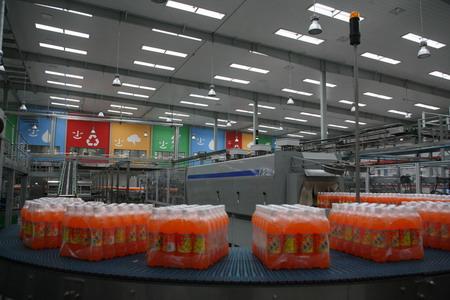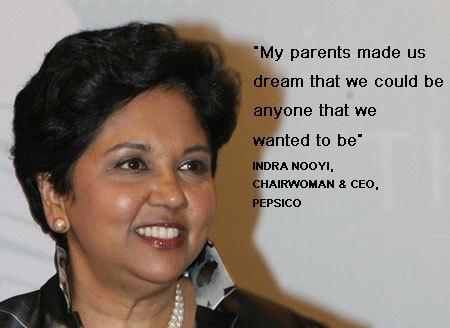
Miranda drinks on the production line of PepsiCo's new plant in Chongqing, Southwest China. The new plant deploys more than 35 water- and energy-saving designs in order to use 22 percent less water and 23 percent less energy than the average PepsiCo plant in China, according to the American beverage company. [Provided to China Daily]
Female at the helm of an international company says she uses her sex to benefit a global businessOn March 9, the 285,000 staff members from PepsiCo received an email from their boss, Indra Nooyi, the India-born chairwoman and chief executive officer.
"I realized how much I would like to be able to be in touch with you all more often to talk about challenges and changes as they happen, so that you always know what I'm mulling over here in New York," Nooyi wrote.
"I thought I'd write to you every two weeks with just a short letter laying out something I am thinking about, excited about, curious about - whatever is going through my mind at the time."
She did not break the promise.
Every fortnight, every PepsiCo staff member receives an email elaborating on certain specific issues. No matter what the subject, from "attention to details" and "do more for communities" to "enhance diversity" and "spend time with families", they have imbued staff with a feeling of "real loving care" - from the highest position in the company. The nature of the emails has, say insiders, gone far beyond just the latest information about corporate strategy and branding.
This is only one illustration of how the 54-old, who was frequently ranked the world's most influential or successful businesswoman by globally leading organizations or newspapers, has implemented what she believes to be right for the development of PepsiCo. And she has done so in a way that is far different from the way male leaders often behave.
In a distinctly feminine way she has balanced concern for staff and the surrounding community while building PepsiCo into a more powerful, profitable and competitive enterprise worldwide.
Nooyi herself believes being a woman gives her a greater advantage in managing and operating a company mainly targeted at pleasing women consumers.
"About 85 percent of consumers of our products are for women. They are mothers who buy goods either for themselves or for their families, so being a woman gives you a great perspective on products in terms of how they appeal to the moms. Secondly, women usually have a softer touch and more connections with the heart," she said.
Nooyi joined PepsiCo in 1994 as chief strategy officer after gaining experience in many international companies, including ABB, Motorola, Boston Consulting Group and Johnson & Johnson.
The then CEO of PepsiCo, Roger Enrico praised her pragmatism, vision and courage, but what impressed him most was her great passion for life and her work.
"This was a woman who was well-known for walking around barefoot and singing songs," he said.
"We were impressed with the breadth of her capability - that she has to absorb so much information and data in so many different categories. It's really terrific and striking," said Bryant Daniel, senior vice-president of global public policy and government affairs at PepsiCo.
Nooyi's wide knowledge comes from her diligence and a habit of reading a lot. She reads books every day and she can finish reading four to five in a week, otherwise, she says, she can't sleep. The topics she prefers are management, geography, politics and romance.
"She is an accomplished leader and good at numbers, strategy and operations. She has high expectations of herself and her team," but she still has an "amazingly strong sense of humor and she always loves to keep job a fun for her colleagues," Daniel added.

Indra Nooyi, the India-born chairwoman and chief executive officer of PepsiCo, is "an accomplished leader, good at numbers, strategy and operations. She has high expectations of herself and her team," said Bryant Daniel, PepsiCo senior vice-president of global public policy and government affairs.
PerformanceNooyi was born to an ordinary family in Chennai. She said: "My parents made us dream that we could be anyone that we wanted to be."
Joining PepsiCo in the 1990s brought her into the limelight of business. After becoming CEO in 2006 she introduced strking changes to PepsiCo worldwide.
Three and half a years ago, PepsiCo launched a new corporate slogan - Performance with Purpose (PwP) - under Nooyi's leadership. It was designed to emphasize the company's commitment to doing business in the long term, not the short term.
"The American industrialist Henry Ford said that a business that makes nothing but money is a poor kind of business. We must think carefully about how we can be a force for good - to be a catalyst for social and environmental change," Nooyi said durng a recent visit to Shanghai.
For Nooyi, performance is the "lifeblood of PepsiCo", but "we want to go a step further". She continued: "On purpose, we articulated three planks - human sustainability, environmental sustainability and talent sustainability. This purpose has to be driven inside and it has to be with passion."
PwP encouraged employees to realize they were first wives, husbands, mothers, fathers, daughters and sons and citizens of every community and country in which they lived and worked.
"This has unleashed their deepest emotions and brought them closer to PepsiCo and, thus, "They not only love coming to work at PepsiCo, but they are also really proud to be part of PepsiCo," she said.
"It's very important for any company to communicate with their audiences that their mission is not only about profit, but also its role in society. PepsiCo is doing the right thing," said Jonathan Chajet, managing director of Interbrand China.
In 2008, PepsiCo's profit surged to $5.6 billion from $1.75 billion in 1994 when Nooyi joined.
Apart from PwP, Nooyi last year successfully led the team implementing the acquisition of its two largest bottlers for $7.8 billion, a move that helped PepsiCo to control distribution of the majority of its products and be quicker to undertake marketing initiatives.
But analysts said the deal's benefits have yet to kick in and the company was under pressure from stakeholders, especially when it released the first-quarter financial figures, widely considered to be disappointing. From January to April, revenue for PepsiCo jumped by 13 percent but still missed Wall Street estimates as sales volume in its Americas beverage business fell four percent.
Nooyi said the results reflected long-term strategy. "Balancing the long-term and short-term is a constant struggle. It takes courage to keep a steady hand and keep one's eyes to the future while delivering quarterly results, but it is something PepsiCo has always worked hard to achieve," she said.
Nooyi was actually a key driver in several key PepsiCo decisions even before she became the CEO. As a vegetarian, she encouraged the spinning off of the fast-food Yum Brands, owner of Taco Bell, Pizza Hut and KFC, and helped the company expand its portfolio by buying in Tropicana and Quaker in a bid to build PepsiCo into a brand that translated into health and choice.
"What PepsiCo wants to do is to provide consumers with a complete portfolio of products. PepsiCo is for fun. It's for good health and it's for you," she said.
But Chajet from Interbrand was critical of the multi-category strategy. "It's true that PepsiCo has become more aggressive and energetic and PepsiCo is closer to consumers" under Nooyi's leadership, but "the company still has difficulty staying consistent in sending one single message" with so many categories under the brand, he said.
Taking seriously a commitment to the long term, according to Nooyi, has important implications for the business leaders of tomorrow. "That kind of hard-edged leader delivering a return on capital no matter what the emotional social cost is, I believe, yesterday's leader," she said.
The new CEOs have to "create sustainable value, have a deep understanding of public and private partnerships, think global but act local and keep learning", she continued.
Love for China
Since the financial crisis, which held back consumption of beverages and food in developed regions, emerging markets have turned out to be a new driving force for PepsiCo, and China is among the most important.
"Getting it right in China is a major priority for us. China is an extremely vibrant consumer market with decades of growth ahead of it. We understand that companies willing to invest in China, with China's goals in mind, can be extremely successful over the long term," she said.
The strategic importance of China aside, Nooyi regards the nation as attractive because of its strong culture and long history. She CEO loves drinking Cao Ben Le and adores Chinese songs, managing to sing some in the right tone and rhythm, including the classic, Jasmine.
In November 2008, PepsiCo announced a four-year investment of $1billion in China, the largest that the world's second-largest beverage and food company has ever made in the country over the past three decades. This May, the company said it will add another $2.5 billion to the world's most populous market over the next three years to build more plants and increase production lines, and enhance its research and development capability.
Nooyi said she was very happy to see that PepsiCo had gained great popularity in China, even a dominant position in some areas such as potato chips. "China's time has come and the next two decades are the golden years for China," she said.
"I do not see such strong business sensitivity and welcoming of business (that China shows) in most countries."
The United Nations Conference on Trade and Development said China was still the most attractive market for foreign investors despite the slowing of its economic growth. Last year, the nation's foreign deposits index (FDI) dropped by just three percent while the figure was 40 percent down for the whole world. From January to April, the FDI grew by 11.3 percent.
As part of its commitment to the Performance with Purpose strategy, last year PepsiCo opened the very first food and beverage plant in China that complies with the rigorous sustainable engineering standards known as Leadership in Energy and Environmental Design.
The new plant in Chongqing deploys more than 35 water and energy saving designs in order to use 22 percent less water and 23 percent less energy than the average PepsiCo plant in China. All the new plants in China in the future will copy the Chongqing model.
Nooyi said PepsiCo had a more ambitious goal: to decrease water use in China to net zero. "It sounds tough, and yes it is, but we recently succeeded in doing this in India and we are committed to making it in China as well," she said.
"We believe PepsiCo and PepsiCo China are on the right track. We are extremely proud of working for PepsiCo," said Cathy Tai, vice-president of Corporate Affairs with PepsiCo Greater China Regions.





